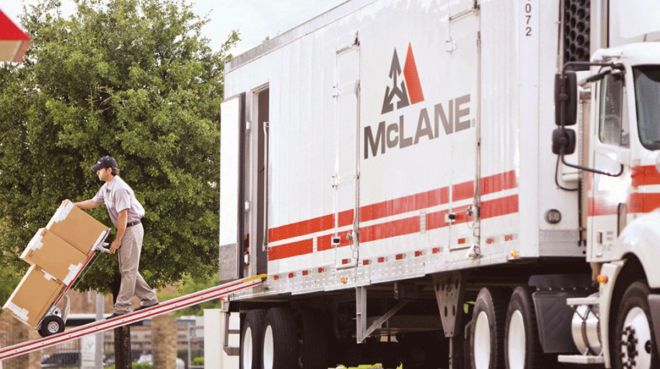In today’s rapidly evolving business landscape, organizations across various industries are constantly seeking innovative ways to enhance their supply chain operations. As the backbone of any successful enterprise, an efficient and well-optimized supply chain can significantly impact a company’s profitability, customer satisfaction, and overall competitive advantage. One company that has emerged as a trailblazer in the realm of supply chain management is McLane.
With a rich history spanning several decades, McLane has revolutionized the industry by pioneering groundbreaking solutions and leveraging cutting-edge technologies. From its humble beginnings as a small logistics company, McLane has grown into a global powerhouse, serving as a trusted partner for countless businesses seeking to streamline their supply chain processes.
History of McLane
McLane is a company with a rich and storied history that dates back to its founding in 1894. The company was established by Robert McLane in Cameron, Texas, initially operating as a small-scale grocery and retail store. Over the years, McLane expanded its operations and gradually transitioned into the wholesale distribution business.

In the early 20th century, McLane recognized the growing demand for wholesale grocery products and began focusing on supplying goods to independent grocery stores and convenience stores. The company steadily expanded its customer base and geographical reach, establishing a reputation for reliability and exceptional service.
In the 1960s, under the leadership of Drayton McLane Jr., the grandson of the founder, McLane underwent a transformative phase. Drayton McLane Jr. recognized the potential in the wholesale food distribution market and implemented innovative strategies to drive growth. He diversified the company’s product offerings and expanded into new markets, catering not only to independent retailers but also to chain supermarkets, drugstores, and restaurants.
The 1980s marked a significant milestone for McLane, as it entered the realm of logistics and supply chain management. The company developed advanced warehousing and distribution capabilities, leveraging technology to enhance operational efficiency and customer service. McLane also began offering value-added services, such as product customization, inventory management, and category management, further solidifying its position as a comprehensive supply chain solutions provider.
In 1990, McLane experienced a major breakthrough when it was acquired by Berkshire Hathaway, the multinational conglomerate led by renowned investor Warren Buffett. This acquisition provided McLane with the financial stability and resources necessary for its continued growth and expansion.
Throughout the 1990s and 2000s, McLane continued to evolve and innovate. The company embraced advanced technologies, including automation and robotics, to optimize its warehousing and distribution operations. McLane implemented sophisticated warehouse management systems and transportation management systems, enabling real-time tracking, efficient routing, and seamless coordination of its supply chain activities.
To further strengthen its position in the market, McLane actively pursued strategic partnerships and collaborations with industry leaders and technology providers. By aligning with companies like SAP, JDA Software, and Oracle, McLane gained access to cutting-edge technologies, industry expertise, and valuable resources, enabling it to stay at the forefront of supply chain innovation.
In recent years, McLane has focused on enhancing its digital capabilities and leveraging data analytics to drive operational insights and improve decision-making. The company has invested in advanced analytics tools, artificial intelligence, and machine learning algorithms to optimize inventory management, demand forecasting, and supply chain visibility.
Today, McLane is a global leader in supply chain solutions, serving a diverse range of industries, including grocery, convenience, quick-service restaurants, and more. The company operates a vast network of distribution centers strategically located across the United States, enabling it to efficiently reach customers nationwide.
Throughout its history, McLane has remained committed to its core values of integrity, customer focus, and operational excellence. The company’s unwavering dedication to providing exceptional service and innovative solutions has earned it a reputation as a trusted partner in the supply chain industry. As McLane continues to evolve and adapt to the ever-changing business landscape, it remains poised to shape the future of supply chain management and deliver value to its customers worldwide.
Unveiling McLane Diverse Business Divisions: Driving Supply Chain Excellence
McLane, a global leader in supply chain solutions, has established itself as a powerhouse in the industry by offering a comprehensive suite of services across various business divisions. These divisions, each with its unique focus and expertise, contribute to McLane’s ability to deliver exceptional value and drive supply chain excellence. In this article, we will delve into the different business divisions of McLane, exploring their key functions, capabilities, and contributions to the company’s overall success.
Grocery Distribution:
At the core of McLane’s operations lies its Grocery Distribution division, which forms the foundation of the company’s supply chain expertise. McLane operates a vast network of distribution centers strategically located across the United States, enabling it to efficiently serve a wide range of grocery retailers, from independent stores to chain supermarkets. McLane’s grocery distribution services encompass everything from product sourcing and procurement to warehousing, inventory management, and timely delivery. By leveraging advanced technologies and a commitment to operational excellence, this division ensures that customers receive high-quality products, optimized inventory levels, and seamless supply chain operations.
Convenience Store Solutions:
Recognizing the unique needs of the convenience store industry, McLane has developed a specialized division dedicated to providing tailored solutions for this segment. McLane’s Convenience Store Solutions division offers a comprehensive range of services, including product assortment planning, category management, store replenishment, and marketing support. Through data-driven insights, strategic partnerships with leading brands, and customized supply chain solutions, McLane empowers convenience store owners to optimize their offerings, enhance operational efficiency, and drive profitability.
Quick-Service Restaurant (QSR) Solutions:
McLane’s QSR Solutions division focuses on catering to the supply chain needs of quick-service restaurants, which require a fast-paced and highly efficient logistics operation. This division offers a suite of services tailored specifically to the unique demands of the QSR industry. McLane provides menu planning and optimization, temperature-controlled distribution, Just-in-Time (JIT) delivery, and specialized inventory management solutions to ensure that QSR establishments can maintain their fast and reliable service while minimizing waste and maximizing freshness. By leveraging its expertise and robust infrastructure, McLane enables QSR operators to streamline their supply chain operations and deliver exceptional dining experiences to their customers.
Alcohol Beverage Distribution:
In addition to its expertise in grocery, convenience, and QSR industries, McLane has established a strong presence in the alcohol beverage distribution sector. This division specializes in the sourcing, warehousing, and distribution of a diverse range of alcoholic beverages, including beer, wine, and spirits. McLane’s Alcohol Beverage Distribution division helps customers navigate the complexities of the alcohol industry, ensuring compliance with regulatory requirements, optimizing inventory management, and delivering timely and accurate fulfillment. By leveraging its deep industry knowledge and relationships with leading alcohol brands, McLane offers customers in the hospitality, retail, and entertainment sectors a comprehensive solution for their alcohol supply chain needs.
McLane’s diverse business divisions play a crucial role in driving the company’s success as a global leader in supply chain solutions. From grocery distribution and convenience store solutions to QSR services and alcohol beverage distribution, each division brings specialized expertise, tailored solutions, and operational excellence to its respective industry. Through strategic partnerships, advanced technologies, and an unwavering commitment to customer satisfaction, McLane continues to empower businesses across multiple sectors to optimize their supply chains, enhance operational efficiency, and deliver superior experiences to their customers.
Also Read: Delhivery – Startup Story, Business Model, Revenue, Growth & Funding
To read more content like this, subscribe to our newsletter



